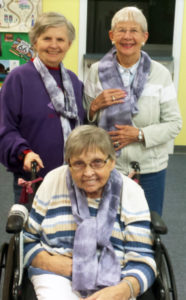Art Therapy Provides Window into the Soul for St. John’s Community Care Clients

*The name of the client in this article is changed to protect her privacy.
When “June”* began the Art Therapy Counseling Program at St. John’s Community Care Day Center in 2017, she was angry all the time: Angry with her husband’s advanced Alzheimer’s disease and angry with her own recent Alzheimer’s diagnosis. During group sessions, “she often snapped at other participants or was impatient with people with some form of dementia,” says Nancy Berry, executive director.
Her anger was evident in her early artwork — huge swaths of color viciously spread on the easel paper. Over several weeks, however, her artwork began to change. With her art therapist, “June” discussed her life in the city and started painting the train tracks she remembered. She then began to reminisce about her parents and wonderful moments of her childhood. Thanks to the program, her anger seemed to dissolve along with the paint. Today, “June’s” daughter has the paintings, which serve as a window into “June’s” past.
UCC-related St. John’s Community Care, based in Collinsville, Ill., began its Art Therapy Counseling Program in 2012. Because art therapy uses the creative process of art making to improve the physical, mental, and emotional well-being of clients, the staff at St. John’s knew the program would benefit the Day Center’s participants. So St. John’s started a conversation with the art therapy master’s program at Southern Illinois University-Edwardsville.
The university “encouraged us to fund a practicum, which greatly increased our chance of having one of their students choose us for their experience with elders,” says Berry. “We have managed to budget those funds (almost $10,000/year) with the help of grants and donations, and have had a practicum student every year.”

Each year’s practicum student interns under the supervision of an art therapist. Normally, participants at St. John’s Community Care can choose individual or group art therapy sessions. Past group sessions have included a Ladies Art Therapy Group — focusing on making art while making friends and learning new skills — and an Eco-Art group, which used natural objects to create art. Group projects often are displayed at one of the center locations before being sent home, which allows for staff and Day Center participants to compliment the artists on their accomplishments.
Due to COVID-19 restrictions, only individual sessions currently are available. Provided by graduate student Xueqi Xiao (who goes by “Shaw”), the sessions are held in a large conference room with appropriate COVID-19 protocols in place. The sessions are provided at no additional cost to the participants.
Before beginning appointments, Shaw works with Adult Day Center Director Stacey Rhodes to determine the focus and structure of the art therapy activities. St. John’s also makes the art therapy available by appointment to families whose loved one either is not currently attending the program, or who is not scheduled on the day the therapist is on-site.
The program has been enthusiastically received by St. John’s clients. “Participants proudly take their projects home to family,” says Rhodes, “hopefully leading to family conversations.”
The Art Therapy Counseling Program helps clients use the creative process of artistic self-expression to resolve conflict, develop interpersonal skills, reduce stress, manage behavior, and increase self-esteem and self-awareness. For St. John’s Community Care, the program has succeeded beyond expectations.
“I was always eager to add art therapy to our program, but I thought it would just improve the crafts we were already doing,” Berry adds. “I quickly learned that the Southern Illinois University-Edwardsville Art Therapy Counseling Program brings much more to our participants. It is amazing how the practicum students are able to assist participants who have great trouble communicating verbally to express themselves and share their worries, anger, and concerns.
“Our Art Therapy Counseling Program enhances our goal of providing care in an environment based on the Christian principles of respecting the dignity and worth of each individual.”
Join Our Mailing LIst
"*" indicates required fields
Follow on Facebook
Denise Buck to Succeed Campbell as IFM CEO - CHHSM
www.chhsm.org
As IFM Community Medicine (IFM) Founder and CEO David Campbell M.D. plans to retire mid-year, his successor, Denise Buck M.D., has started working full-time with IFM in St. Louis. Before assuming this...